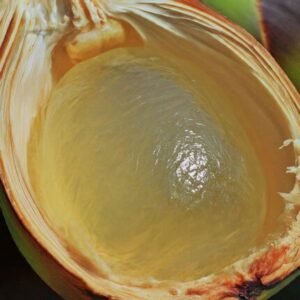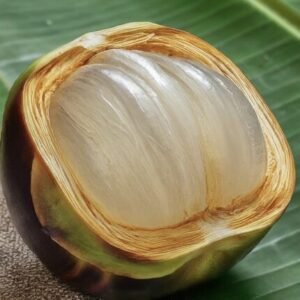Medically reviewed by Dr. Ramesh Gaddam, M.D. — Written by Sumalatha, D.N.H.E
Ice apple, also known as palm fruit or toddy palm fruit, is the fruit of the Palmyra palm tree (Borassus flabellifer). It is native to the Indian subcontinent and Southeast Asia. The fruit is roughly spherical in shape and has a hard, woody outer shell. Inside, there is a translucent, jelly-like pulp which is sweet and refreshing.
Ice apples are often consumed fresh, especially during the summer months, as they are considered cooling and hydrating.
They are also used in various culinary preparations such as desserts, drinks, and salads.
Additionally, the sap of the Palmyra palm tree is fermented to produce toddy, an alcoholic beverage.
Nutrition of Ice Apple
Nutritional profile of ice apple per 100 grams:
| Nutrient | Amount |
|---|---|
| Calories | ~70 kcal |
| Water | ~90 g |
| Protein | ~0.6 g |
| Fat | ~0.2 g |
| Carbohydrates | ~17 g |
| Fiber | ~0.9 g |
| Sugars | ~15 g |
| Vitamin C | ~22 mg |
| Potassium | ~290 mg |
| Calcium | ~26 mg |
| Iron | ~0.6 mg |
Benefits of Ice Apple
Ice apples, also known as palm fruits or toddy palm fruits, offer several potential health benefits:

Hydration
Ice apples have a high water content, making them an excellent choice for staying hydrated, especially during hot weather or after physical activity.
Nutrient-rich
They contain various essential nutrients such as vitamins (including vitamin C), minerals, and antioxidants. These nutrients contribute to overall health and well-being.
Low in calories
Ice apples are relatively low in calories, making them a healthy snack option for those watching their calorie intake.
Digestive Health
The fiber content in ice apples can aid digestion and promote regular bowel movements, thus supporting gastrointestinal health.
Cooling properties
In traditional medicine systems like Ayurveda, ice apples are believed to have cooling properties, which can help alleviate heat-related ailments and provide relief during hot weather.
Source of natural sugars
Ice apples contain natural sugars like fructose and glucose, providing a quick source of energy.
Electrolyte balance
The electrolytes found in ice apples, such as potassium, can help maintain proper fluid balance in the body and support nerve and muscle function.
Antioxidant properties
The presence of antioxidants in ice apples may help neutralize harmful free radicals in the body, potentially reducing the risk of chronic diseases and supporting overall health.
Skin health
Consuming ice apples may promote skin health and contribute to a radiant complexion due to their hydrating and nutrient-rich nature.
Weight Loss:
Low in calories and rich in water, ice apples can aid in weight loss efforts by promoting a feeling of fullness.
Liver Support:
Potassium-rich ice apples may assist in treating liver irregularities, supporting liver health.
Anti-Inflammatory:
Ice apples contain phytochemicals with anti-inflammatory properties, potentially slowing down the aging process.
Calories of Ice Apple
The calorie content of ice apples, also known as palm fruits or toddy palm fruits, can vary slightly depending on factors such as size and ripeness.

However, on average, ice apples are relatively low in calories.
- Approximately, 100 grams of ice apples contain around 70-80 calories.
This makes them a relatively low-calorie snack option, particularly considering their hydrating and nutritious qualities.
However, it’s essential to keep portion sizes in mind, as excessive consumption can still contribute to calorie intake.
Uses of Ice Apple
Ice apples, also known as palm fruits or toddy palm fruits, have various culinary and non-culinary uses.

Here are some common uses:
Consumption as Fresh Fruit
Ice apples are often eaten fresh, particularly during hot weather, for their cooling and hydrating properties.
Preparation of Beverages
The translucent, jelly-like pulp of ice apples can be blended with water or milk to make refreshing beverages.
Sometimes, it is mixed with sugar or other flavorings to enhance the taste.
In Desserts
Ice apples can be used in desserts such as fruit salads, ice creams, sorbets, and puddings, adding a unique texture and flavor.
Cooking
In some cuisines, ice apples are used in cooking, especially in Southeast Asian dishes.
They can be incorporated into savory dishes like curries, stews, and chutneys.
Traditional Medicinal Uses
In traditional medicine systems like Ayurveda, ice apples are believed to have cooling properties and are used to alleviate heat-related ailments.
Production of Beverages
The sap extracted from the Palmyra palm tree is fermented to produce toddy, an alcoholic beverage.
This toddy is used as a base for various alcoholic drinks.
Crafts and Decorations
The hard outer shell of ice apples can be dried and used for various crafts or as decorative elements.
Animal Feed
Ice apples that are overripe or damaged may be used as feed for animals.
Landscaping
Palmyra palm trees, which produce ice apples, are often grown for landscaping purposes due to their majestic appearance and resilience in hot climates.
Biofuel Production
Palmyra palm trees are being explored as a potential source of biofuel, and ice apples are just one part of the tree that can be utilized in this regard.
These are just a few examples of the diverse uses of ice apples in different aspects of human life, ranging from culinary applications to traditional medicine and beyond.
Side Effects of Ice Apple
While ice apples (palm fruits) are generally considered safe for consumption and offer various health benefits, there are a few potential side effects and considerations to be aware of:

Allergic Reactions
Some individuals may be allergic to ice apples or components within them.
Allergic reactions can vary in severity and may include symptoms such as itching, swelling, rash, difficulty breathing, or gastrointestinal discomfort.
If you have known allergies to similar fruits or nuts, use caution when trying ice apples for the first time.
High Sugar Content
Ice apples contain natural sugars, primarily fructose and glucose.
While these sugars can provide a quick source of energy, consuming them in excess may contribute to weight gain, tooth decay, and blood sugar spikes.
Particularly for individuals with diabetes or those trying to manage their weight.
Digestive Issues
In some cases, consuming ice apples in large quantities or for individuals with sensitive stomachs may lead to digestive issues such as bloating, gas, or diarrhea.
This may be due to the fruit’s fiber content or individual tolerance levels.
Pesticide Residues
Like many fruits, ice apples may be treated with pesticides during cultivation to prevent pests and diseases.
If you’re concerned about pesticide residues, opt for organic ice apples when available, or wash them thoroughly before consumption.
Interactions with Medications
If you are taking medications or have existing health conditions, it’s essential to consult with a healthcare professional before adding ice apples to your diet.
Certain medications or medical conditions may interact with components in ice apples, potentially leading to adverse effects or complications.
Risk of Choking
The hard outer shell of ice apples can pose a choking hazard, especially for young children or elderly individuals.
Exercise caution when consuming ice apples and remove the outer shell completely before eating.
Over-consumption
While ice apples offer health benefits, consuming them excessively may lead to imbalances in nutrient intake or calorie overload.
As with any food, moderation is key to maintaining a balanced diet.
Summary
Overall, ice apples are considered a nutritious and safe addition to a varied diet for most people.
However, individuals with specific health concerns or dietary restrictions should exercise caution and consult with a healthcare provider if necessary.
Summary:
Medically reviewed by Dr. Ramesh Gaddam, M.D.

General Physician, Diabetologist, and Critical Care Specialist.
Discover more from Health Build-Up
Subscribe to get the latest posts sent to your email.







